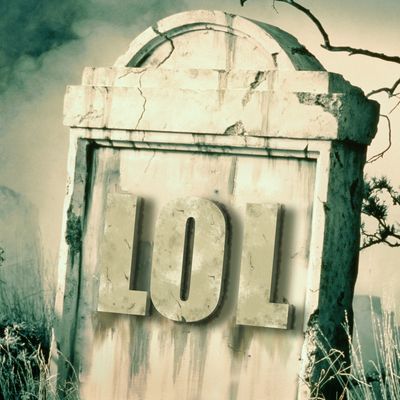
I’m literally dying at the way Jessica Bennett’s recent piece in the New York Times about hyperbole online nails a particular trend. We’ve become so inured to most text dialogue that we have to exaggerate everything to get even a hint of actual emotion across (just ask any headline writer forced to describe a moderately funny zing as a “perfect response” to a “hilarious tweet”). Our standards have gradually risen, or else we’re simply more immune to sentiment. If you’re replying “ha-ha” to a friend, you might as well not respond at all. You possibly “can’t even,” but if you can, you have to be “SCREAMING,” or, in a highly non-literal way, “literally dying” — a phrase which, Bennett’s young assistant tells her, “has become, like, the new LOL.”
So where does that leave poor LOL? As internet language detaches itself from any relationship to off-keyboard action, it’s become less and less useful to tell people what you’re doing with your body. “Laughing out loud” is already generally understood to be metaphorical rather than literal — hence the need to write “actually LOLing” when you are. And what a paltry metaphor “laughing out loud” is compared to “literally dying”! But this doesn’t mean the internet will stop using LOL. Instead, LOL has ascended to the firmament, an all-meaning, all-useful fixture of internet speak. LOL is dead; long live LOL.
LOL’s meaning was once mundane, functional. It was coined in the late ‘80s as a means of expressing what couldn’t be communicated in an early chat room — the moment when something online made you laugh so hard IRL that it became embarrassing, at least in a context where most people didn’t understand that being on a computer on the internet could possibly be funny.
The term was initially derided, but it evolved into a useful shorthand as chatting online became a mainstream experience in the 1990s — the first of many cycles of ironic and sincere use that the term would undergo over the next two decades. As it became so commonplace as to lose its literal meaning, LOL fractured into various iterations: LMAO — “laughing my ass off” — was one alternative, now experiencing a sarcastic renaissance on Twitter; “Ha.” was the go-to for knowing laughter, schadenfreude, or simple acknowledgement that a joke had been made; ROFL presented another less-than-subtle option, but the ROFLcopter GIF was only ever deployed in a joke on someone else’s expense (see also the infamous and highly inappropriate lollercaust). And, as The New Yorker points out, “hahaha” is alive and well in a relatively sincere form.
But as these cousins and descendants have fallen in and out of popularity, LOL, the web’s Ur-laugh, remains. LOL can mean whatever you want: an actual, genuine laugh; a sarcastic, derisive snort; an acknowledgement of another person’s presence. In many cases its basic purpose isn’t to mean a specific thing at all — it’s to communicate a shared understanding of a conversation. As a placeholder and suffix it can “signal basic empathy between texters,” as linguist John McWhorter has argued; it tells your interlocutors “we’re speaking the same language.”
Above all, LOL today is the nervous laughter of being online — the giggle that comes from the strangeness of media this new, where we never really know where we stand. The challenge of constant, always-available communication undertaken without the important signaling done by our faces or tones of voice produces an anxiety voiced by LOL — at once referring to the physical act of laughing and distancing itself from it.
In some ways, “literally dead” accomplishes the same thing. We are not dead, nor literally much of anything when online, but we’re still using these phrases in an attempt to break through the internet’s depersonalizing communication barriers.
In Bennett’s article, she ascribes the usage of “ded” to typing so quickly you can’t even be bothered to include the a in dead. But I think we’re all better typists than that. Each excluded letter, mistaken spelling, and smashed key of internet slang is an intentional building block of ever-changing meaning — and of further distancing our online cultural signals from those we make use of offline. Evolving to its medium, our internet language is ever more abstract, non-literal, and subtle, especially when used to critique itself.
Among my personal internet co-conversationalists, in fact, ded has taken on some of the tone of the sarcastic LOL, a dry, world-weary utterance meaning that the mundane stupidity of the internet is slowly killing you, not that you died laughing. It’s very useful. As in, “this Times trend piece about internet vocabulary makes me ded.” LOL.





























